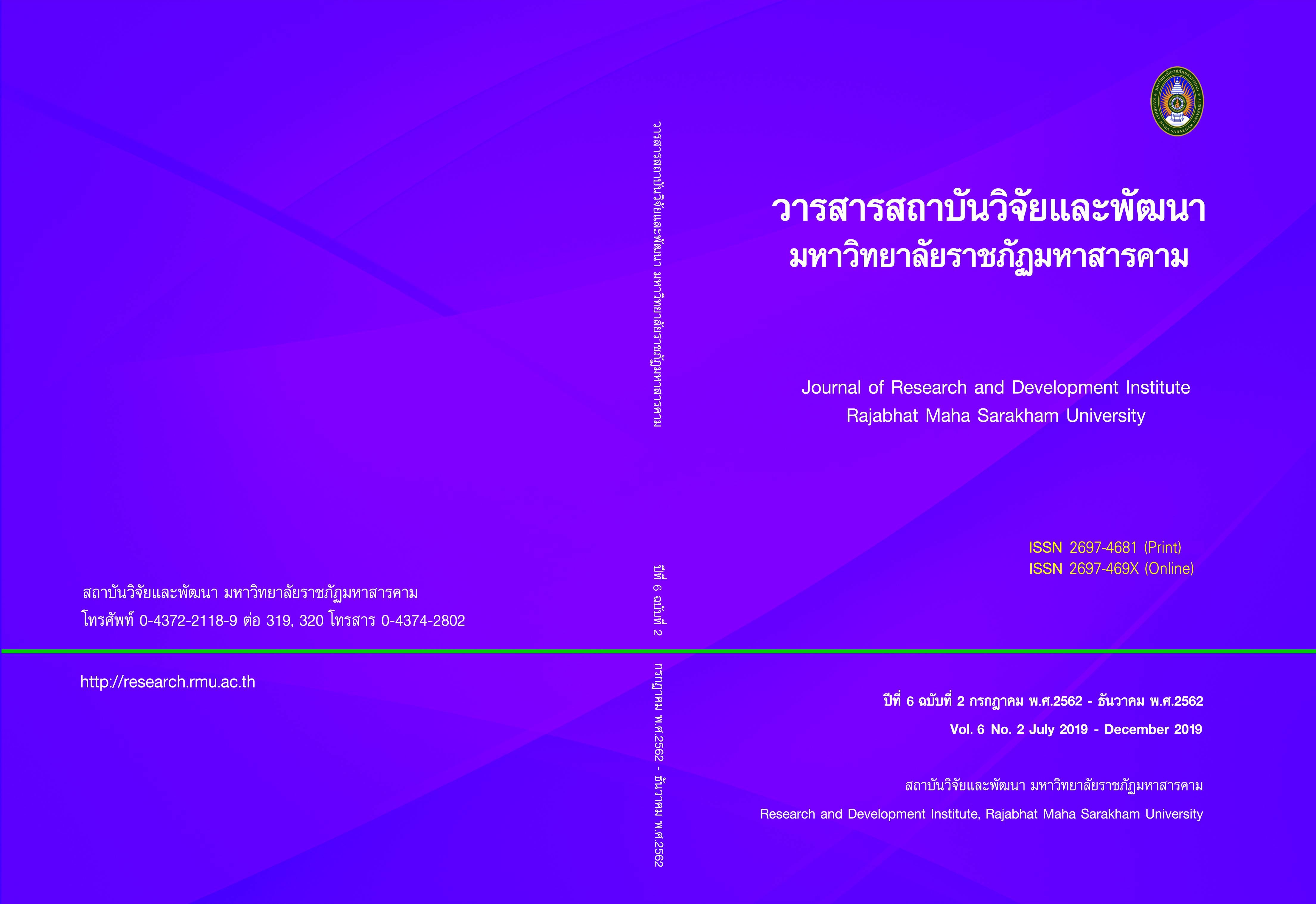Comparative Study of Financial Planning According to the Sufficiency Economy Philosophy
Abstract
The objectives of this research were to study 1) to study the level of financial planning in accordance with Sufficiency Economy Philosophy, and 2) to compare financial planning based on sufficiency economy philosophy. This research was quantitative research. Sampling Group were people in Muenag district, Maha-sarakham province 400 sampling. Research instrument was questionnaires. Data were analyzed by percentage, mean, standard deviation and One-way ANOVA. The research found that 1) Overview of practices in Financial Planning in Sufficiency Economy was “high” (=3.83, S.D.=0.70). When considering each side, the order from the average to the least were the assessment of financial status according to the principle of Modesty (= 3.88, S.D.= 0.83), monitoring and improvement of financial planning based on knowledge and virtue (=3.83, S.D.= 0.92), determining personal financial goals based on rationality (= 3.82, S.D.= 0.85) and compliance with financial plans according to financial immunity principles (= 3.79, S.D. = 0.91) 2) Comparison of financial planning based on sufficiency economy philosophy of people in Muenag district, Maha-sarakham province, classified by age, educational level, occupation and status. Financial planning in accordance with the philosophy of Sufficiency Economy was different, statistically significant at the 0.05 level by gender and number of family members different. Financial planning in accordance with Sufficiency Economy Philosophy, not different statistically significant at the 0.05 level.
References
Cronbach, Joseph Lee. (1974). Essentials of Psychological Testing. New York : Harper and Row.
Gitman, Lawrence J., Joehnk, Michael D., and Billingsley, Randy. (2013) Personal Financial Planning. [Online] https://www.amazon. com/Personal-Financial-Planning...Gitman/.../1111.. [9 June 2018]
Kanjana Hongthong. (2008). Financial compass. Bangkok: Bangkok Business. [In Thai].
Kasem Wattanachai. (2011). CSR in accordance with the Philosophy of Sufficiency Economy. Bangkok: CSR Club, Listed Companies Association. [In Thai].
Kittiporn Sitthiphan. (2009). Factors Influence Personal Financial Planning of People in Bangkok. Master of Business Administration Thesis : Bangkok University. [In Thai].
Maha Sarakham Provincial Statistical Office. (2015) Provincial Statistical Report 2014. [Online] http://www.Mahasarakham.nso.go.th/index.php?option=com…view…mkm repoet 2556. [9 June 2016]. [In Thai].
Mukda Kowhakul. (2016). “Personal Finance Management Affecting to the Saving Behavior of People in Bangkok Metropolitan Region”. Business Administration and Economics Review,12 (1) : January-June, p. 128-149. [In Thai].
Rungsan Singhalert. (2008). Research Methodology and Statistics for Social Science Research. Maha Sarakham: Triple Group. [In Thai].
Siam Kerdjaras. (2018). “PERSONAL FINANCIAL PLANNING FOR RETIREMENT: A CASE STUDY OF THA SAI HOUSING COMMUNITY, BANGKOK”. SUTHIPARITHAT, 32 (102) : April - June 2018 . [In Thai].
Woraphob Sonsap-anan. (2011). Personal Financial Planning of Students at the Faculty of Economics, Chiang Mai University. Chiang Mai: Faculty of Economics, Chiang Mai University. [In Thai].
Yamane, Taro. (1967). Statistics, An Introductory Analysis. 2nd edition. New York: Harper and Row.
Downloads
Published
How to Cite
Issue
Section
License
Articles that are published are copyrighted by the authors of the articles







